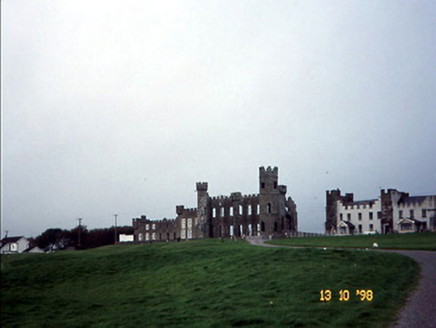Survey Data
Reg No
21301401
Rating
Regional
Categories of Special Interest
Architectural, Historical, Social
Previous Name
Ballyheigue Castle
Original Use
Country house
Historical Use
Prison/jail
Date
1805 - 1810
Coordinates
74833, 128295
Date Recorded
26/10/2005
Date Updated
--/--/--
Description
Remains of detached two- and three-storey Tudor Gothic Revival style country house, built 1809, incorporating fabric of earlier house, 1758. Comprising six-bay two-storey side (south) elevation of entrance block with battlemented parapet, single-bay three-storey battlemented corner turrets on circular plans and nine-bay two-storey lower wing (originally return) to west having battlemented parapet and corner machicolation. Burnt, in 1840, later used as prison, burnt, in 1921 and now mostly collapsed. Wing reconstructed and remodelled, c. 1975, to accommodate use as apartments with remainder of building now ruinous. Castellated parapets with one cast-iron hopper having floral motif. Snecked sandstone walls with grey limestone string courses and plinth, castellated machicolations, blind arrow loops and having render to parts of side wall with imitation ashlar. Square-headed openings with limestone sills, surrounds, hood mouldings and having sandstone relieving arches. Timber window frames in side openings. Four-centred arch to doorway in double-height arch having window above with carved spandrels. Detached nine-bay two-storey Tudor Gothic Revival style former stable complex, built c. 1810, to east on an L-shaped plan about a courtyard with battlemented parapet, with single-bay two-storey corner turret on a circular plan and three-bay side elevations. Extensively renovated in latter part of twentieth century with pair of single-bay single-storey gabled projecting porches added to accommodate use as apartments. Detached six-bay single-storey rubble stone-built outbuilding, built c. 1810, to east on an L-shaped plan with series of elliptical-headed integral carriage arches, now disused. Section of rubble stone boundary wall to east with series of arrow loops possibly originally part of walled garden.

